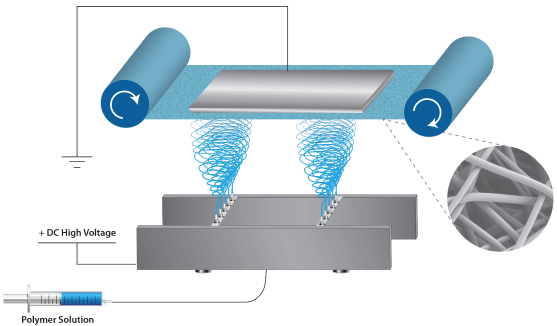Electrospinning technology is a method of producing nanofibers using electrical forces to draw charged threads of polymer solution. These fibres have a diameter of a few hundred nanometres and offer unique capabilities for creating novel fibres with controllable microstructure characteristics. Nanofiber technology enables these innovations, providing a cutting-edge approach to material science.
Technology
Electrospinning

Discover the World of Electrospinning Technology
While this process is well-established in academic research, its translation and use in industry has been limited. At Matregenix, we are working to bridge this gap and help turn nanofiber innovations into disruptive products using advanced nanofiber technology. We believe that we have successfully addressed the challenges of consistency and scalability in the electrospinning process through advanced nanotechnology and are now well-positioned to create new and innovative products.
Applications
Tiny fibers, big impact!
Nanofibers are a revolutionary class of materials that have unique properties that open a wide range of possibilities for various industries. Their small size, high surface area to volume ratio, and ability to be tailored to specific properties make them suitable for a wide range of nanofiber applications, from biomedical and environmental to energy, industrial and defense. The potential of nanofiber technology and nanofiber solutions is vast and seemingly limitless, making nanofiber technology a promising field for future developments and solutions to some of the world's most pressing issues.
Biomedical
Applications
- Scaffold for cell growth and tissue engineering
- Drug delivery systems
- Artificial organs and implants
- Wound healing
Environmental
Applications
- Water and air filtration
- Sustainable materials
- Biodegradable packaging
Energy
Applications
- Energy storage and conversion
- Li-ion battery separators
- Li-ion battery anodes
- Solar cells and photovoltaics
Industrial and Manufacturing Applications
- Industrial and automotive applications
- Textile and clothing manufacturing
- Catalysts
- Composites
- Food packaging and preservation
- Cosmetics and personal care products
Defense
Applications
- Armor and protective clothing
- Chemical, Biological, Radiological and Nuclear (CBRN) systems
- Camouflage and stealth technology
Other
Applications
- Sensors and biosensors
- Antimicrobial and antiviral coatings
